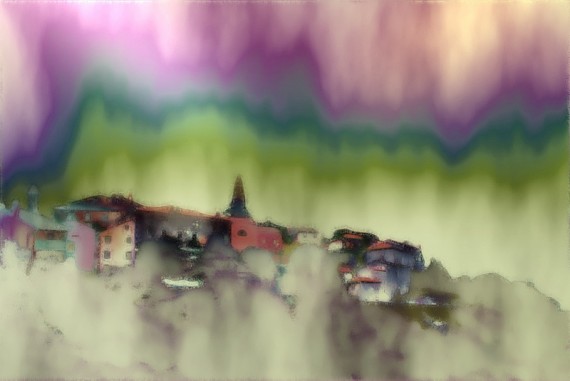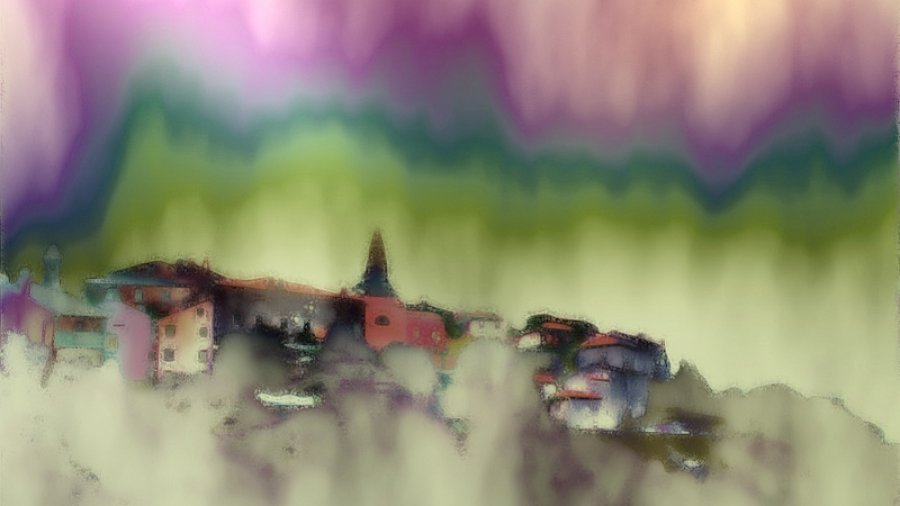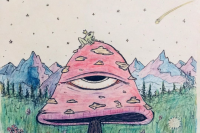Recently, I read an extraordinary collection of letters written by Rainer Maria Rilke, the renowned Bohemian-Austrian poet who passed away in 1926.
Between 1903 and 1908, Rilke penned a series of responses to a would-be writer, offering advice on poetry and on being a sensitive individual in an often cruel and unforgiving world. These letters, which were published posthumously as Letters to a Young Poet, have received widespread recognition as containing remarkable insights into Rilke’s work and perspective.
Throughout the letters, Rilke unravels a smorgasbord of sentiments that challenge the reader and provoke considerations of great depth and resonance. To be sure, these letters are worth reading in full.

However, I want to share two passages from one particular letter that contain insights from which I think anyone can benefit, and which seem especially poignant to me.
1. Love Your Solitude
In this passage, Rilke writes of the solitary nature of human existence:
“Therefore, dear Sir, love your solitude and try to sing out with the pain it causes you. For those who are near you are far away, you write, and this shows that the space around you is beginning to grow vast. And if what is near you is far away, then your vastness is already among the stars and is very great; be happy about your growth, in which of course you can’t take anyone with you, and be gentle with those who stay behind; be confident and calm in front of them and don’t torment them with your doubts and don’t frighten them with your faith or joy, which they wouldn’t be able to comprehend. Seek out some simple and true feeling of what you have in common with them, which doesn’t necessarily have to alter when you yourself change again and again; when you see them, love life in a form that is not your own […] and don’t expect any understanding; but believe in a love that is being stored up for you like an inheritance, and have faith that in this love there is a strength and a blessing so large that you can travel as far as you wish without having to step outside it.”
Much can be said about this passage. Although Rilke is addressing the young poet, I’m going to write as if he is addressing all of us because I think his words can safely be extended to all.
In the first sentence, Rilke suggests that we should love our aloneness, despite the pain that it will inevitably bring us. We should try to “sing out with the pain it causes us”. In other words, we should try to find the beauty in our struggle; we should create something honest and real in the midst of our difficulty, whether that be a poem or song or novel or simply a candid and heartfelt conversation with a friend.
This theme — that pain can result in something beautiful — recurs throughout the letters. Rilke holds that we are too hasty to flea from sorrow, when in fact we don’t understand how it may be transforming us for the better. Rilke suggests that pain is a necessary condition for growth.
Because Aloneness is a Fact of Life
As the passage continues, Rilke acknowledges that as we blossom as individuals, as our inner worlds expand, we will of course become increasingly alienated from those around us. We will become more aware of our solitude, our separation. This is why it is all the more essential that we learn to be okay with being alone, and even to love this condition, as it is one that will only prove more pressing and inescapable as the years pass us.
Still, though, in our solitude we can preserve and cherish our relationships. Rilke posits that we should “seek out some simple and true feeling” that we have in common with those we love, one which we can always share despite the changes that will come.
I see this as encouraging us to always appreciate the common bond of humanity that we share with those in our lives. The universal feelings of delight, humor, irritation, disappointment, excitement, and uncertainty will always inhabit all of our lives. As paths diverge and people become different, we should seek to “love life in a form that is not (our) own”. We should celebrate each other’s uniqueness.
Rilke admits that we cannot expect understanding. Though we can empathize with one another, each of us will ultimately remain a mystery to everyone we encounter, and perhaps even to ourselves.
Finally, Rilke concludes the passage by encouraging us to believe — to trust that in our aloneness and in our despair, a love is growing within us. We must believe that we are moving closer to something, that in our painful growth lies a burgeoning strength and understanding that will become our dearest companion.
I Feel You, Rilke
Rilke’s ideas in this passage strike me as profound. Having lived in Korea for about 6 weeks now — surrounded by people who don’t speak my language and without the company of my family and friends — I have felt the weight of my solitude more forcefully than at any point prior.
Fortunately, over the past few years, I have become someone who is comfortable being alone, who needs to be alone much of the time. In addition, I’ve made some wonderful friends here who have supplied that invaluable camaraderie that all of us require in varying degrees.
Yet, my aloneness has been heavy at times; I’ve felt alienated. Rilke’s words help me to understand that it is through these trials that I can come to more fully embrace an unavoidable truth of human existence — that we are always alone within ourselves. We must make peace with this fact and affirm our solitude, knowing that in it we can discover strength and compassion. Everyone is undergoing this same struggle.
2. Love the Unresolved Questions
In this passage, Rilke writes of uncertainty:
“You are so young, so much before all beginning, and I would like to beg you, dear Sir, as well as I can, to have patience with everything unresolved in your heart and to try to love the questions themselves as if they were locked rooms or books written in a very foreign language. Don’t search for the answers, which could not be given to you now, because you would not be able to live them. And the point is, to live everything. Live the questions now. Perhaps then, someday far in the future, you will gradually, without even noticing it, live your way into the answer.”
Because We Can Never Know Everything
Uncertainty can be a paralyzing and maddening sensation. So much of life is paradoxical, incomprehensible, unknown and even unknowable. If we become obsessed with needing a rational answer for everything, we will surely torture ourselves.
Rilke encourages us to “love the questions”, to love the mystery, to accept that a life of incomplete knowledge has been the fate of every person since the dawn of self-awareness.
Instead of tormenting ourselves over who we should be, what we should do, why we exist, or other such matters, we should “live everything”. Instead of spending our time on the futile analysis of the unknowable, we should embrace the sensations of the moment. We should live the mystery, because we are meant to live, to experience, not to understand everything. Perhaps, Rilke concludes, we will eventually stumble upon our answers, in time.
This passage, similar to the one on solitude, asserts a difficult-to-stomach fact of our lives: that we cannot know everything.
Rilke Seems to Have Called Me Out
Recently and in the past, I have been guilty of endlessly intellectualizing the details and enormous question marks of my life, of trying to explain away all the uncertainty.
But each time I grow content with my explanations, it seems that I am confronted by something new that rattles my convictions. If I grow too comfortable in my illusion of understanding, I seem to be troubled exponentially more when I am met with the inexplicable or the incompatible, a crack in my illusion.
I certainly don’t think this means we should stop asking questions. We must always question. It’s the need for definitive answers that can destroy us. On a fundamental level, life will always be a mystery to each of us. We can never be certain of what we think we know, and there will always be an infinite number of things that we do not know. This is surely a troublesome notion for our arrogant human minds, but maybe it doesn’t have to be.
Rilke gently nudges us toward a place where that which is unresolved is not something to fear, but something to love. His insights push me toward solace, a mode where I can be content to appreciate the impenetrable, where I can live and love the questions in my mind and heart.
Conclusion: This is Why I Read
It seems that Rilke’s wisdom reached me at a time when I was unknowingly thirsting for it (funny how that happens sometimes). Despite the many “high on life” moments I’ve had in Korea, living abroad continues to challenge me to grow in ways that I had not expected and don’t fully understand.
Every small problem seems to be enhanced by the knowledge that I am alone and inexperienced in this country. And in my solitude, I’ve turned to books more than ever before. I’ve read 8 books, 6 of them novels. In those books I’ve found laughter and tears. I’ve found connection to human beings, alive and dead. I’ve found calming stories and metaphysical nourishment.
If books played no role in my life, I wouldn’t have read Rilke’s letters. I wouldn’t have shared these thoughts with you. So, I guess I’m saying that I’m glad I read, and I’m grateful to have found the sobering advice of a man long since swept away by the river of time.
Thank you, Rilke, for reminding us that to be human is to be alone and uncertain, and that by affirming those conditions, we can grow to love them.
Photo Credit: Sara Biljana
P.S. If you found this writing to be valuable, you might be interested in the ways to receive free updates from Refine The Mind. Lastly, I encourage all of you to read Letters to a Young Poet. It’s ripe with many more wonderful treasures.
About Jordan Bates
Jordan Bates is a Lover of God, healer, mentor of leaders, writer, and music maker. The best way to keep up with his work is to join nearly 7,000 people who read his Substack newsletter.






I’m not sure how I first happened upon your blog, but I have been subscribed via Feedly for some time now. Thank you for this post – my favorite yet. Cheers.
Katie, wonderful to hear from you and as always, touched to hear that someone regularly tunes in to read my work. So glad that this post was your favorite yet; thank you for the feedback. 🙂 Cheers to you and take care!
Hi Jordan! This is the first piece I read by you and man!! its soooooo good. I truly believe that this found me at a time when I needed it the most 🙂 I am coming face-to-face with unresolved questions and uncertainties with the beginning of a relationship. Yes, it scares me at times. And I am soooo thankful to you for sharing this! The passages truly rang with me and you explained it all so lucidly. It was a joy reading it! I am gonna write these down and remind myself of this wisdom periodically. Thank you so much!… Read more »
Esha, Thank you so much for the comment! I really appreciate hearing that it came to you when you needed it. Can’t ask for much more than that. The beginning of a relationship is such an exciting and uncertain time! I’ve compared it to being in a small boat paddling down a river, approaching a huge waterfall, and hoping you can fly. I’m glad I was able to explain the text in a way that resonated with you. 🙂 I hope you’ll continue to stop by, read, and drop a comment from time to time! Take care. Peace and light… Read more »
You bet! 🙂 The topics you write about are very helpful and insightful as well. I like your writing!
All the best for your future endeavors 🙂
I do my best to write the types of things that would be valuable to me and that I think people should know about, so that’s great to hear that you find my content valuable. Thank you, thank you. All the best to you too! 🙂
Francis, I read your “Starry, Starry Night” piece and thought it was excellent. It’s somehow very comforting to know that there are other people out there who have struggled with the same predicaments and paradoxes of being a minuscule being in a vast and unknowable cosmos. You seemed to arrive at a conclusion similar to Alan Watts’ idea that we are here to just be, to just see and seek and experience all that we can. Learning to dance with the uncertainty of life’s big questions is quite difficult (especially for those of us who are irrevocably drawn to pondering… Read more »
I like your verbalization. Yes, I suspect we should at least find the Questions, and diligently search for those questions we have not yet found. As for the Answers…
I wonder if we drank from the same cup? Here’s a ramble from me… It’s called “Starry, starry night”. There is a cyber portal (www.chopperstories.com) but here is the direct link: http://www.writersharbor.org/work_view.php?work=445 If you have time to read it, I would be intrigued at your response.